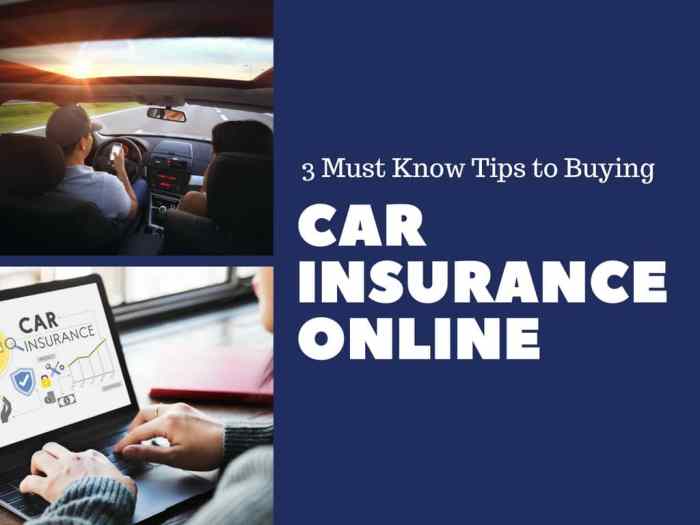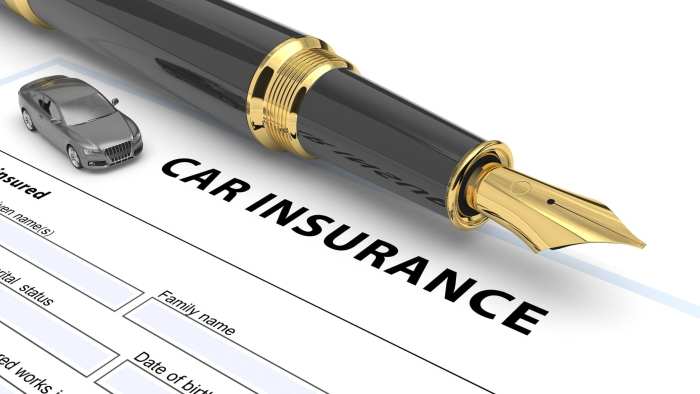Stepping into the world of car ownership often comes with a whirlwind of responsibilities, and securing car insurance ranks high among them. As a first-time car insurance buyer, you may feel overwhelmed by the intricacies of coverage options, deductibles, and premiums.
Fear not, for this comprehensive guide will equip you with the knowledge to make informed decisions and protect your vehicle and yourself.
Navigating the realm of car insurance can be daunting, but with careful planning and research, you can find a policy that suits your needs and budget. This guide will delve into the essential aspects of car insurance, empowering you to make informed choices and ensuring you’re adequately covered on the road.
Define Your Coverage Needs

Identifying your specific insurance requirements is crucial when purchasing car insurance for the first time. Different types of coverage are available, each serving a unique purpose and providing varying levels of protection. Understanding these options and aligning them with your individual needs ensures you have the appropriate coverage in place.
Types of Coverage
1. Liability Coverage
Covers damages caused to others, including bodily injury and property damage, in an accident you are responsible for.
Legally mandated in most states.
2. Collision Coverage
Covers damages to your own vehicle in an accident, regardless of who is at fault.
Optional, but recommended for newer or expensive vehicles.
3. Comprehensive Coverage
Covers damages to your vehicle caused by events other than a collision, such as theft, vandalism, or natural disasters.
Optional, but recommended for vehicles parked in high-risk areas or subject to extreme weather conditions.
4. Medical Payments Coverage
Covers medical expenses for you and your passengers in an accident, regardless of who is at fault.
Optional, but recommended for added peace of mind.
5. Uninsured/Underinsured Motorist Coverage
Covers damages caused by drivers who do not have insurance or do not have enough insurance to cover the damages they cause.
Optional, but recommended as it protects you from financially irresponsible drivers.
Research and Compare Quotes

Securing affordable and suitable car insurance is a crucial step for every first-time car owner. Comparing quotes from multiple insurance providers is essential to ensure you’re getting the best deal for your specific needs.
Before requesting quotes, it’s important to understand your coverage requirements and budget. This will help you evaluate and compare quotes more effectively.
Gather Quotes from Multiple Providers
- Online Comparison Tools: Utilize online comparison tools that allow you to enter your information once and receive quotes from multiple insurers.
- Insurance Agents: Contact local insurance agents who represent various companies. They can provide personalized quotes based on your needs.
- Direct Contact: Visit or call insurance companies directly to obtain quotes. This approach allows for a more tailored discussion of your requirements.
Compare Coverage, Deductibles, and Premiums
When comparing quotes, consider the following factors:
- Coverage: Ensure that the policy covers the types of risks you’re concerned about, such as collision, comprehensive, liability, and personal injury protection.
- Deductibles: The deductible is the amount you pay out of pocket before the insurance company starts covering expenses. Higher deductibles typically result in lower premiums.
- Premiums: The premium is the amount you pay for the insurance policy. Compare premiums from different providers to find the best deal.
Deductibles
paragraphWhen you purchase car insurance, you’ll have to choose a deductible. A deductible is the amount you have to pay out of pocket before your insurance company starts to pay for repairs. The higher your deductible, the lower your premium (the amount you pay for your insurance each month) will be.
However, you should also consider how much you can afford to pay out of pocket if you need to make a claim.
Choosing the Right Deductible
There are a few factors you should consider when choosing a deductible:* Your budget: How much can you afford to pay out of pocket if you need to make a claim? If you have a tight budget, you may want to choose a higher deductible to lower your premium.
Your car
How old is your car and how much is it worth? If you have an older car that’s not worth very much, you may want to choose a higher deductible. However, if you have a new car that’s worth a lot of money, you may want to choose a lower deductible to protect your investment.
Your driving record
If you have a clean driving record, you’re less likely to get into an accident and make a claim. In this case, you may be able to afford to choose a higher deductible. However, if you have a history of accidents or tickets, you may want to choose a lower deductible to make sure you’re covered if you need to make a claim.Ultimately,
the best deductible for you depends on your individual circumstances. Talk to your insurance agent to get help choosing a deductible that’s right for you.
Consider Discounts and Savings

First-time car insurance buyers may be eligible for various discounts and savings that can help reduce their insurance premiums. These discounts can be categorized into several types:
- Bundling Policies: Combining multiple insurance policies, such as car insurance and home insurance, with the same provider can often lead to a discount. This is because insurers offer a lower rate when you insure multiple policies with them.
- Good Driving Record: Maintaining a clean driving record, free from accidents and traffic violations, can result in significant savings on car insurance premiums. Insurance companies view drivers with a good driving record as lower risk, making them eligible for lower rates.
- Safety Features: Installing certain safety features in your car, such as anti-lock brakes, airbags, and anti-theft devices, can qualify you for discounts on your car insurance. These features help reduce the risk of accidents and theft, making you a more desirable customer for insurance companies.
- Student Discounts: Many insurance companies offer discounts to students who maintain a certain grade point average (GPA) or are enrolled in specific academic programs. These discounts are designed to reward students for their academic achievements and encourage safe driving habits.
- Military Discounts: Active and retired military personnel, as well as their families, may be eligible for discounts on car insurance. These discounts recognize the unique risks and challenges faced by military members and their families.
- Multi-Car Discounts: If you own multiple vehicles, you may be able to obtain a discount on your car insurance by insuring all of them with the same company. This discount is typically based on the number of vehicles you insure and the overall risk profile of your household.
Usage-Based Insurance (UBI) Programs:
Some insurance companies offer Usage-Based Insurance (UBI) programs that track your driving behavior and adjust your premiums accordingly. By monitoring factors such as mileage, driving speed, and braking patterns, UBI programs can reward safe drivers with lower rates.
Read and Understand the Policy
Familiarizing yourself with the insurance policy’s terms and conditions is crucial. The policy Artikels the coverage you’re entitled to, exclusions, and the process for filing claims. Understanding these aspects ensures you make informed decisions and avoid surprises during the claims process.
Key Sections to Review
- Coverage Limits: These limits define the maximum amount the insurance company will pay for various types of claims, such as property damage or bodily injury.
- Exclusions: The policy will specify events or situations not covered by the insurance. It’s essential to understand these exclusions to avoid coverage gaps.
- Claims Procedures: The policy Artikels the steps you need to take to file a claim, including the required documentation and timelines.
- Definitions: The policy contains definitions of key terms used throughout the document. Understanding these definitions ensures you have a clear understanding of the coverage provided.
Choose the Right Insurance Company

Selecting the right insurance company is essential for a smooth and reliable insurance experience. Consider the following factors to make an informed decision:
Reputation and Financial Stability
- Reputation: Look for companies with a positive reputation in the industry. Check online reviews and ratings from reputable sources.
- Financial Stability: Choose companies with a strong financial foundation to ensure they can fulfill their obligations.
Customer Service
- Availability: Consider companies that offer multiple channels for communication, such as phone, email, and online chat.
- Responsiveness: Evaluate how quickly and efficiently the company responds to inquiries and claims.
- Claims Handling: Research how the company handles claims and whether they have a history of fair and timely settlements.
Benefits of Choosing a Reputable Company
- Peace of Mind: Knowing you’re insured by a reputable company provides peace of mind in case of an accident.
- Quality Service: Reputable companies often offer better customer service and support.
- Fair Claims Handling: You’re more likely to receive fair and timely claim settlements from a reputable company.
Consider Usage-Based Insurance

Usage-based insurance (UBI) is an innovative approach to car insurance that offers first-time buyers a more personalized and potentially cost-effective insurance experience. UBI programs use technology to track driving behavior, such as mileage, speed, braking habits, and time of day driven, to determine the individual’s risk profile.
How UBI Works
UBI programs typically involve installing a device in the vehicle that collects data on driving habits. This data is then analyzed by the insurance company to assess the individual’s risk level. Drivers who exhibit safer driving habits may qualify for lower insurance rates, while those who engage in riskier behaviors may pay higher premiums.
Types of UBI Programs
There are two main types of UBI programs:
- Pay-As-You-Drive (PAYD): With PAYD programs, drivers pay a base rate plus a variable rate based on the distance they drive. The more miles driven, the higher the insurance cost.
- Pay-How-You-Drive (PHYD): PHYD programs consider not only the distance driven but also the manner in which the vehicle is operated. Factors such as speeding, hard braking, and nighttime driving can impact the insurance rate.
Review Your Policy Regularly
It’s important to review your car insurance policy annually or whenever there are significant changes in your circumstances, such as getting married, buying a new car, or moving to a new location. This will ensure that you have adequate coverage and that you’re not paying for unnecessary extras.
Keep Your Policy Up-to-DateIt’s easy to let your car insurance policy lapse, especially if you’re young and healthy. But it’s important to keep your policy up-to-date, even if you don’t drive very much. This will protect you in the event of an accident.
Ensure Adequate CoverageAnother reason to review your policy annually is to ensure that you have adequate coverage. The amount of coverage you need will vary depending on your circumstances. But as a general rule of thumb, you should have at least the minimum coverage required by law in your state.
File a Claim if Necessary
File a Claim if Necessary

In the unfortunate event of an accident or loss, knowing how to file a claim with your insurance company is crucial. Here’s a step-by-step guide to assist you during the claims process.
It’s important to act promptly and gather the necessary documentation to support your claim. These typically include:
Required Documentation and Information
- Police Report: If the incident involves an accident, obtain a copy of the police report as soon as possible.
- Driver’s License and Insurance Information: Have your driver’s license, insurance card, and policy number ready.
- Vehicle Information: Provide details such as the make, model, year, and license plate number of the insured vehicle.
- Accident or Loss Details: Clearly explain the circumstances surrounding the accident or loss, including the date, time, and location.
- Damages: Take photos of the damages to your vehicle or property and include them with your claim.
- Contact Information: Provide your contact information, including your phone number and email address, so the insurance company can reach you.
- Medical Records (if applicable): If there are injuries, provide medical records and bills related to the accident.
Additional Tips and Considerations

As a first-time car insurance buyer, it’s important to be aware of certain additional factors that can affect your coverage and rates.
Consider these tips to ensure you have the best coverage at the most affordable price.
Maintaining a Clean Driving Record
Maintaining a clean driving record is crucial for keeping your insurance rates low. Avoid traffic violations, accidents, and DUIs, as these can lead to higher premiums.
Avoiding Modifications That Increase Risk
Certain modifications to your car, such as performance enhancements or aftermarket parts, can increase your risk of accidents and lead to higher insurance rates. Consult your insurance company before making any modifications.
Considering Gap Insurance if Applicable
If you’re leasing or financing a new car, consider purchasing gap insurance. This coverage protects you in case your car is totaled or stolen, and the amount you owe on the loan exceeds the actual cash value of the car.
Being Prepared for Unexpected Events
Life is unpredictable, and unexpected events can happen at any time. Ensure you have the necessary coverage in place to protect yourself and your vehicle in case of an accident, theft, or natural disaster.
Reviewing Your Policy Regularly
Your insurance needs can change over time. Review your policy annually to ensure you have the right coverage and limits. Adjust your policy as necessary to reflect changes in your life, such as getting married, having children, or purchasing a new car.
Last Recap

As you embark on your journey as a car owner, remember that car insurance is not just a legal requirement; it’s a safety net that provides peace of mind. By following these tips, you can ensure you have the right coverage to protect yourself, your vehicle, and others on the road.
Stay informed, compare quotes, and choose a policy that aligns with your needs and budget. Safe driving and happy motoring!
Helpful Answers
Q: What factors should I consider when choosing a car insurance company?
A: When selecting a car insurance company, consider their reputation, financial stability, customer service ratings, and the availability of coverage options that meet your specific needs.
Q: How can I save money on my car insurance premiums?
A: You can potentially lower your premiums by maintaining a good driving record, bundling your policies, opting for a higher deductible, and taking advantage of discounts offered by insurance companies.
Q: What is usage-based insurance (UBI), and how can it benefit me?
A: Usage-based insurance tracks your driving behavior and rewards you with lower premiums if you drive safely. UBI programs can encourage safer driving habits and potentially save you money on your insurance.
Q: Why is it important to review my car insurance policy regularly?
A: Regularly reviewing your policy ensures that your coverage limits are adequate and that you’re aware of any changes in your policy. It also allows you to update your policy if your circumstances change, such as adding a new vehicle or driver.
Q: What should I do if I need to file a claim?
A: In the event of an accident or loss, contact your insurance company as soon as possible to initiate the claims process. Be prepared to provide documentation, such as a police report, photos of the damage, and repair estimates.



